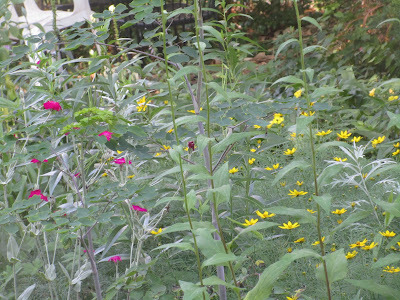Robert Knox's Blog, page 3
August 7, 2022
Growing Space for a Garden: An Origin Story in a Few Stark Images
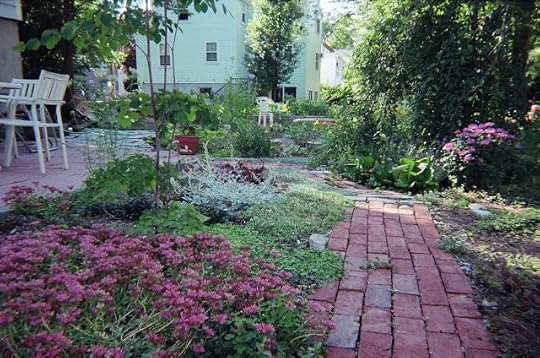
After moving to Quincy, Mass., in the fall of 2004, from Plymouth, where we had lived for twenty years, we decided to create and plant a flower garden -- from scratch -- the following summer. Anyone who has seen my recent photos knows it's a jungle -- or as I like to call it, a "rain forest" (except that we don't get any rain this summer). Very green, and everything growing on top of each other.
I recently got hold of some pictures I took in those early years, when we had a desolate semi-landfill of a failed lawn stripped off and added new soil, by the truckload, and began to lay out a semi -- or "informal" -- garden on the new, bare ground. We laid out paths, bought an ornamental cherry tree as a centerpiece and laid out some stone and brick pavers for the paths.
Lately, this odd digital service called OneDrive delivered me (unasked) some images of "the way we were" back in those early days. I was shocked. Not just by how "open" the garden space appeared, but by how much I liked it.
So, I wrote a kind of nostalgic prose poem. A kind of hankering after lost innocence. First, some more photos, then the poem.
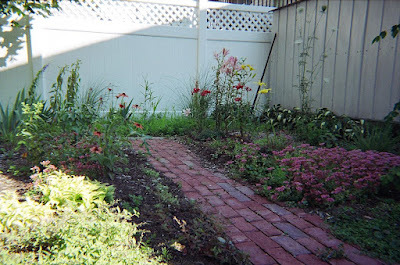
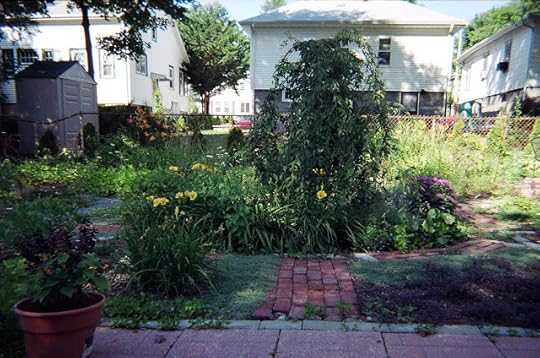
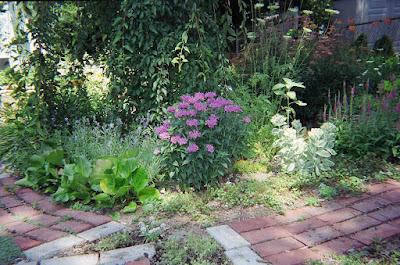

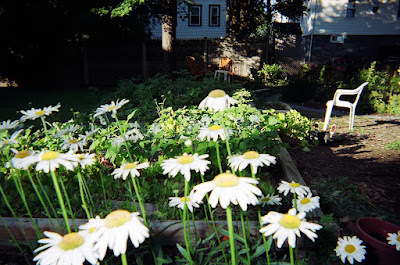
Innocent Days in the Garden
The garden is so thin and spare, lovely and plain at the start.
I am nostalgic for beginnings.
We bought a small ‘ornamental’ tree, planted it smack
in the middle of available space, of which there was much.
Poured dirt by the purchased truckful,
raked it flat ourselves.
We made circles of stones, then filled between with "City Hall" red bricks,
laying paths between the planting beds.
Wee plantings called “Steppables” edged the planting beds, outlined circles
A few large cornerstone shrubs, plus borrowed lilies,
kidnapped from the Berkshire roadsides and kept moist in plastic buckets,
brought home for display in sunny segments beyond
the arc of the circle in the shadow of the hedges,
provided brighter color.
Looking back, with architect’s (or empire-builder’s) remorse
now that “OneDrive” has returned me to the beginning of things
with a loaded deck of online snaps…
Regard! I mean, these lovely clean Vermont-blue paving stones
we treated ourselves to,
laid along the spare foundation line of the house –
It’s Sherwood Forest today!
The silvery-blue of the pavers marred by the dirt of
a thousand footsteps, then ten thousand more
Debris of the greenwood-groundcover encroaching both sides,
Dead-leaf remains from the endless grind of the seasons
brown-filling between the steps.
See also the blooms of our first plantings
unique statements of their primal selves, all so full and bonny
No crowding, or elbowing for a place in the sun
Admire White Shasta Daisies, tall and light-filled,
A ranked file marching into beauty’s battle,
Long scattered now, far fewer in flower, never so clean
And the low lacy Cosmos, finely woven in their own geometry
Extirpated from ground where raspberries have long since taken root
The tree circle itself, airy and bright, speaks of rational design.
(The French would approve.)
Note the tree itself, a sapling growing into its birthright,
and the broad dark red pile of Spirea blossoms,
surge skyward, like a perfectly measure hairdo,
before it got away from us, so fast and tall and upward,
consuming the circle until I was forced to pick it up by the roots:
relocated now in a poorer neighborhood, kept alive on foodstamps
And the clean look beside the old, sheet-metal shed,
later wholly destroyed by the mythic snows of the winter of 2015,
snow cycles in their endless, repeated iterations, crushing the roof.
Beside it back then, more daylilies, something pink, something red:
Those petal days, where are they now?
And that city-hall red brick path so shapely and light-filled
And – from the look of it – so much work to lay!...
Year by year, I have conjured for us a rain forest, jungle thick,
that crowded into the imperial spaces of a primordial imagination –
But at what cost? –
having sacrificed something both clean and true.
[P.S. Here's a photo I took today]

July 24, 2022
The Garden of the Seasons: The Early Growing Months in a New England Perennials Garden
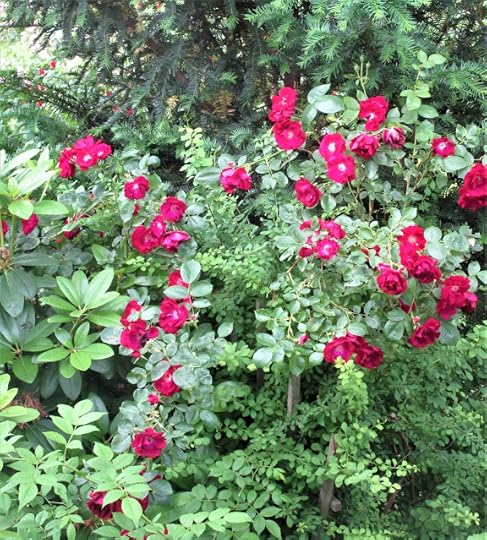
Old Roses, still blooming every summer in June.
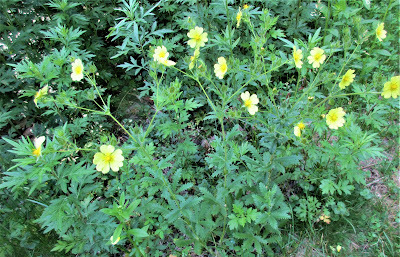
The slate path through the backyard garden.
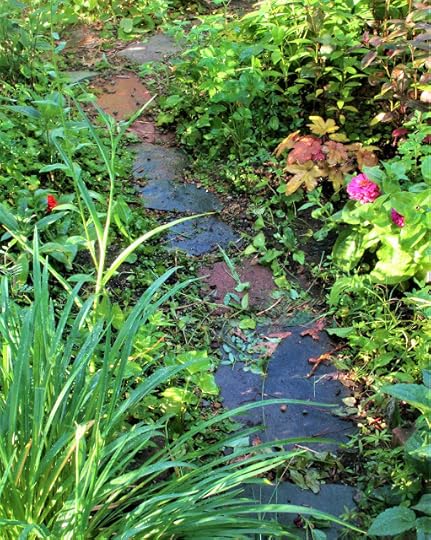
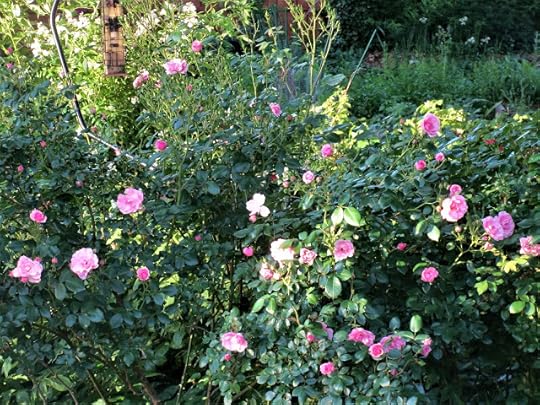
Pink rose blossoms in June. The hanging birdfeeder is well behind amid raspberry bushes.
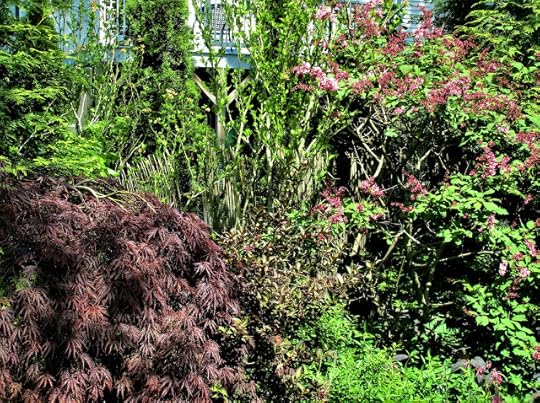
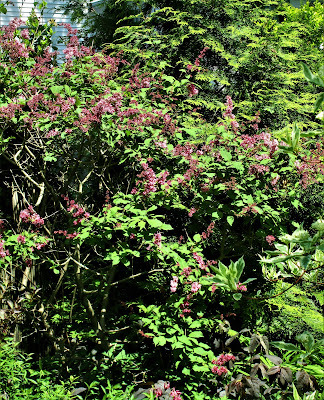
The Lilacs, early June, in strong light.
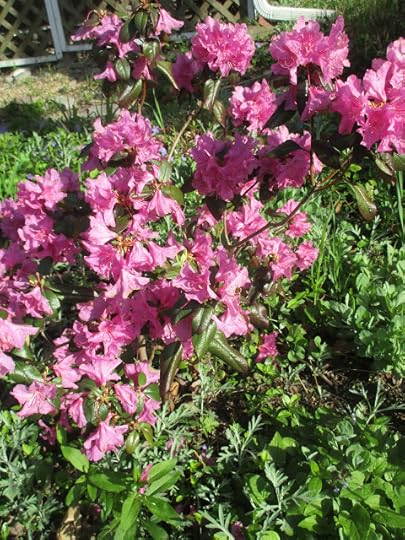 Back in May, a flowering Azalea.
Back in May, a flowering Azalea.
The next four photos are of Crocuses, in April. Among the first to flower, and the first to pass.
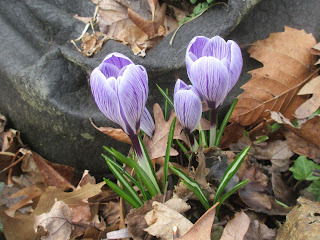
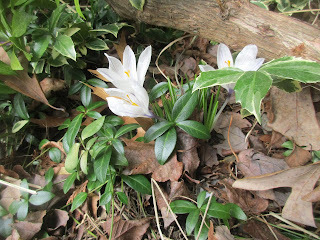
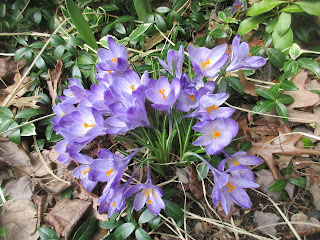
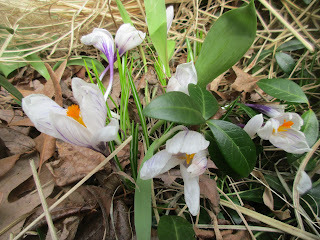
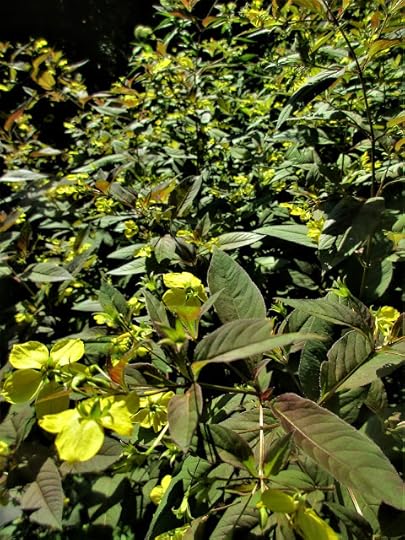 With yellow blossoms and violet-tinged leaves that look army-brown in dull light, these are Lysimachia vulgaris. They bloom in late June, many of the blossoms still hanging on in late July. The plant is a spreader, and will take its neighbor's space and sunlight.
With yellow blossoms and violet-tinged leaves that look army-brown in dull light, these are Lysimachia vulgaris. They bloom in late June, many of the blossoms still hanging on in late July. The plant is a spreader, and will take its neighbor's space and sunlight. 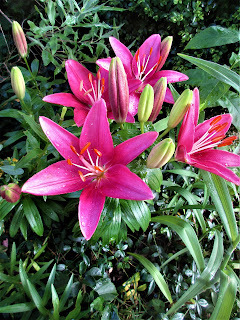 An Asiatic Lilly blossoming in our part- to largely shaded front yard.
An Asiatic Lilly blossoming in our part- to largely shaded front yard.These are the last of our white Peonies, blooming close to the ground.
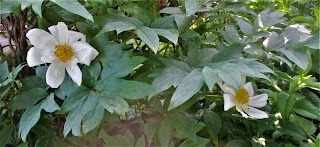

Another moment in June. The purple flowers are Spiderwort. Behind them, the white blossoms of Rosa Multiflora.
The Garden of Verse: Poetry in Plymouth's First Parish Church
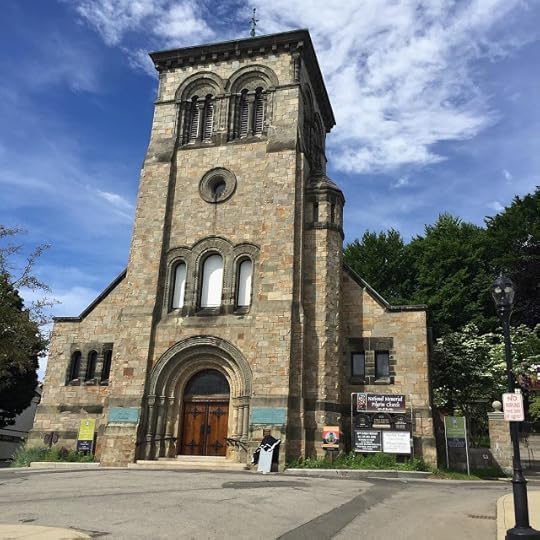
First Parish Church, a Unitarian-Universalist parish traces its roots back to the Pilgrim colony, invited me to read some poems on political and social question themes last week.
I was happy to oblige. The parish holds its summer morning services in the parish house chapel, a modest airy room with its own chasm, rather than in the famous stone church.
The relaxed and intimate setting proved a perfect room to read in, and the attentive congregation proved to be an ideal audience. Connecting with a room is a wonderful experience for a poet.
My political poems tend to be angry and sometimes complicated. A few are droll and satirical or, I dare say, funny -- at least in part.
Some of the members of summer crowd waited after the service to thank me. I had to ask myself, 'are we all too old for a big group hug?' Anyway, I'm imagining a verbal hug.
For anyone who wishes to sample the poems I read -- some of them written recently in response to the evil events of the last few months; some of them written during the Evil Days of Trumpery, which I continue to believe must remain in the past -- I'm posting these poems below. It was about a 20-minute reading.
Sunflower People
You hide in the subway tunnels
of life’s unending nightmares
You walk, or ride, or hire cabs for thousand-dollar journeys
to a border crossing
that is no longer open
You struggle down roads of vulnerability and fear, carrying your baggage,
your children,
who belong not only to you,
but to your country,
and to us all
You shelter in rubbled cities,
holes blown in once-solid blocks
of home and hearth,
sacred refuges that once housed human bodies and souls
by the hundreds,
people no more, nor less breakable than any of us,
left abandoned and vulnerable,
now that death has come to a land
where sunflowers bloomed
You, who flee
and carry one another’s burdens
along pitted roads to the hope of a tomorrow
somewhere safer than today,
that haven
we have all promised ourselves.
That earthly haven
in which we may celebrate another spring,
another birthday of the earth
You carry our lives in your journey
as well as your own,
and those of your loved ones, your ancestors,
and the memory of ours as well,
There is room enough, I know, in your souls,
to carry all these
as there is world enough for you
in ours
Come, walk in our shoes as well:
there is world enough for all.
Texas in Hell
The eyes of the others,
les autres*
Hate mongering
Closed doors of the mind in self-panic
Race-pandering Congressional creeps
stalk the Halls of Hades
When? in God’s name?
A universal set of trigger-fingers
in circular execution
A lake of burning fire
Armed to the teeth = utterly unprotected
Gehenna on the dusty plain
Looking into the eyes
of the lost
No consolation in the knowing
Self-slaying America
Compelled to repeat the same self-torture
endlessly: forever
Infinite self-slaughter
An underworld of hate,
unholy perdition
*”The others,” a reference to Sartre’s play about hell, titled (in English) “No Exit.”
Slaughter of the Innocents
They are burying children
On the first days of June
The world is a beautiful place
That we have turned into a slaughterhouse
I ask the Roses to forgive me
I beg the Irises to stay a while longer
And help us become as they are, keepers of beauty
Teach us to walk in the natural light of compassion
And avoid the thorny dells of the heart
from which only blood flows
Peonies soon will arrive, but will they remain?
Are they not our children too
and so acquainted with the brevity of our compassion?
The slimness of our restraint, our capacity not only
for the severing of living beings,
But for wielding the stubborn serpent’s tongue that sloganeers
over slaughter?
Ah, you wildflowers of the vernal wild
When we clip you by the necks
And proclaim to the skies that these sacrificial blooms
Stand for the memory children of Uvalde, the children of Newtown,
of Parkland,
For the cruelly extinguished lives of bullet-flowering Columbine…
And when the Peony blossoms, and the Rose in their hundreds and hundreds
Of tiny white blossoms, their eyes on forever, scent the air,
Shall I hasten to the sacramental taking
of a few dozen here, a few dozen there?
No one will miss them and soon, of course, they will be gone,
returned to the shadows, as will we all,
even those who enable the taking of children from the gardens of humanity
You will recognize these disturbances of the airwaves, sniff their memes,
Inhale the self-satisfied atmosphere of the servants of the Moloch AR-15
Give us Barabbas! they cry
Of which state, we inquire, is Pilate the Senator?
Of which charnel house the Governor?
Then, perhaps, my fellow takers of the fruits of the Earth,
Who live and love by the bounty of Earth
In regions both warm as love and cool as reason,
You will join me when we declare a final and concluding bounty
On those who insist upon placing the law’s protective armor
on the wasters of the gardens of childhood and love.
B i p o l a r A m e r i c a
My America (Part I)
Looking at you these fallen days (or me in the mirror)
I join the ranks of your disappointed admirers
We are no longer saving the world
we are saving our jobs
Frankly, I am sick of the whole 'greatest country in the world'
chest-thumpery
and if there were somewhere else to go I would go there
but (still true) if you are not part of the solution
you are part of the problem
and I know which part I wish to be
America, my transcendental gender-free inamorata, you are my sole support
I am one of your pensioned ex-lovers, as
glimpsed in the film version of ‘what-we-now-really-are,’
walking the boardwalk somewhere desolate, like Atlantic City,
the New Jersey Crimea, sucking up air like one of Chekov's washed-up emigres,
after the rodeo, after the gold rush, after the film festival,
after the failed uprising, after the media has packed up and gone home
to spend a quiet evening in the hotel with their phones,
one of your disappointed vampires in need of a bloody fix,
scanning the pre-dawn streets for Ginsberg set-piece atrocities,
the best minefields of America, dodging gunned-up, hyped-up, trumped-up
scaredy-cops shooting black men because we are afraid of black men
(understandably, perhaps, given all we have done to them?)
and are of course still doing with fanny-pats of approval
from race-card Republican judges
America, ghoulish dreamboat, ancient lover gone in the teeth,
eager for wounds to lick cuz you like the taste,
you grow comfortable with the deaths of others
They are dying in Aleppo
Other countries (nursing their own broken mirrors) ask,
"What are they are thinking in America?"
They are not thinking in America
Thinking is not done in America,
some calculation of course, some texting, some advertising,
some truly boorish emoting
It's always about us, isn't it?
‘If not, then why are you bothering me?’
My America! after the big affair, after the ball is over,
your kick-line of sulky dwarfs cleaning up behind the parade
You were young once
We were all young once
Your bright young men wore wigs and tight pants, showed a leg
Ladies learned to smoke, swear, dance and dip to apocalyp-stick swingtime
America, your century is over
You open your faded arms to tinpot dictators,
make eyes at banana republics, don the latest looks from funhouse mirrors,
worship pigs who despise everything you ever stood for
... all for a botched democracy, a menopausal male
gone grouchy in the knees, stiff in the frontal lobe
You have no use for carping critics
who spend time spooning with their buddy Google,
the single pop culture lightweight who can stand their company
Write me a check and I'll get out of town
My America (2)
My America, however, is a guy with a distinctly 'different' name
that is to say clearly not Anglo-Saxon (a tongue with more than
enough funny names
of its own), for example banjo player 'Bela Fleck'
combining Hungarian roots with the Appalachian mountain music that now
defines his instrument,
itself a melding of deep-flowing currents, Celtic, English, African-American
Who travels to Africa to trace the banjo's genealogy
in hide-covered stringed instruments brought here by slaves
In the film* you can see the respect in his eyes as his fingers work to copy
a finger-picking rhythm pecked at hummingbird speed by a Malian guitar player
and the respect in the eyes of the African players of the akonting
(a three-stringed, long-necked banjo antecedent)
as they see what Fleck can do with the modern version
The country, that is, of Yo-Yo Ma, Lang Lang, my Quincy neighbors
whose grandfathers visit to play backyard basketball with preschool grandsons,
the lady who shouts with the half-dozen words we share that I have
planted my garden in the wrong place. 'What are these?' she points. 'Nothing to eat?'
The country of my wife's grandfather Meier who escaped the czar's army
to carry a sewing machine to work in Brooklyn
My close-mouthed father, born here in unlucky times,
who never once in our hearing spoke a word of his Depression childhood,
but survived to give us what he lacked and carried his secrets to the grave
The Nisei soldiers who stormed up mountains in Italy to take Nazi forts
while their parents were interned somewhere in the ambivalently 'Great' Plains,
and those with names like DiMaggio whose mothers were forced to register each year
as enemy aliens and whose travel-restricted fathers could no longer visit their sons' restaurants
while they fought in Europe and the Pacific
Of citizen Khizr Khan, whose officer son died protecting those who served under him
in Afghanistan,
a country much like this one in having too many wars. (My America can be improved.)
And Zarif Khan, who founded an Afghani community in of all places Wyoming,
by taking advantage of a collection of opportunities such as the ranch-hands' pent-up demand
for fresh tamales, the stock market, freedom of travel, the right to vote,
found perhaps nowhere else but in these United States
Of Darlene Love who went from house cleaner, to backup singer, to contributing
"Christmas (Baby Please Come Home)," to the nation's permanent holiday playlist
The country where an author (Barbara Ehrenreich)
could write a book titled "Nickel and Dimed: On (Not) Getting By in America"
and not be hounded by Putin's police
Of Cesar Chavez, Joan Baez, Sonia Sotomayor, Roberto Clemente, Rita Moreno
A country of 'climbing-up' ordinary heroes, open minds, thinkers and doers, money makers and music makers
with names our own Moms and Dads never heard of,
but learned to play nice with for the good of the whole, e pluribus unum
transcending the clans and tribalisms that set other worlds on fire
because we were the others, the strangers, the newcomers once, the genuine alien nation
*"Throw Down Your Heart," 2008
‘I Have Lost a Country'
"What signifies the beauty of nature when men are base?" – Henry David Thoreau
He was thinking about the Fugitive Slave Act,
speaking at an anti-slavery rally along with Sojourner Truth in 1854
after Anthony Burns, who had escaped from bondage,
was arrested in Boston, where he was "working quietly
in a clothing shop" on Beacon Hill.
It's just one more thing. It happens everywhere.
It's a tipping point.
Someone tips off a slave-catcher, they're hunting up North now
empowered by federal law.
Burns is hauled before a special judge, in a special court,
created by the Fugitive Slave Act to facilitate claims against persons of color –
"persons"! that Constitutional euphemism – by any white person.
Boston rallies and 'mobs' of protestors war with police,
seeking to free Burns, who is dragged through the streets
by federal marshals with guns drawn, guarded by an artillery regiment
and three platoons of marines, while thousands of angry locals
watch helplessly, cowed by force of arms.
Burns is returned to Virginia, shackled,
and flogged.
At the rally held in Framingham, Mass. on July 4, 1854,
Thoreau confided that he had suffered "a vast and indefinite loss" –
but, he asked himself, what was it? "At last it occurred to me
that what I had lost was a country."
And so, reading in yesterday's newspaper, and again today,
that armed thugs, "federal officers" culled from border police and ICE,
were firing weapons, hurling flash bombs,
and kidnapping protestors from the streets of Portland, Oregon,
where they had no lawful business to be
and where no assistance from the federal government
had been sought by local authorities –
but simply performing in the absence of all legal warrant
as Trump's chosen "Brown Shirts,"
I find myself thrown once again into days of rage,
unsettled in my mind, as I too often have been
in these dark days:
feeling deprived of something valuable, if imperceptible,
dear to me and to many:
discovering that I too have 'lost my country,'
and that finding it again is no sure thing.
The American Gulag: An Elegy
Weep not for the family of Márcio Goulart do Nascimiento*
who crossed the river for fear of being murdered by the neighborhood drug lords
in Brazil, where police told him, 'if you complain
you will be killed.'
For now they are safely jailed in Texas, Marcio and his wife in one place,
his two children somewhere else in the American gulag,
convicted of infringing on the peace and security
of the great Land of Liberty
because, as he himself confessed, "I did not wish us to be killed."
Weep not for Juan Francisco Fuentes Castro, fleeing the violent streets of El Salvador,
who sought only, he pled ("may it please the Court") to bring his children to safety,
for surely they are safe now behind bars.
Some day, perhaps, he will see them again.
Nor weep for poor José de Jesús Días of Mexico,
who fails to understand why the court cannot tell him
where his daughter is.
And so he alone will not accommodate the Court with the obligatory guilty plea
until someone can tell him where in this land of freedom
they have placed her, safe behind bars.
For it is a simple thing, is it not, to declare one's guilt
for wetting one's feet in the sacred waters of Destiny's Dividing Line
in order to preserve the lives of one's own family members?
The Madonna would understand. The Savior would understand.
The judge too sympathizes, but his hands are tied by the bonds of Liberty.
Weep not for José de Jesús Días, for he is patently 'illegal.'
His daughter too is illegal,
but now no doubt safe in a place made of bars and uniforms,
among the tribes of lost children.
Nor let us shed our tears for the sufferings of Elizabeth González Juárez,
who alone among so many, knows where her daughter is.
She crossed the River of Tears from Guanajuato, Mexico,
to protect from harm a three-year-old child, abused by her
drug-dealing father,
and sought the healing Balm of Gilead in the home
of her own mother who dwells among the kind and peace-loving souls
of Fort Worth, Texas.
Alas, the Land of Liberty could spare no refuge for a single infant more
upon a camel's back of three hundred million souls,
and so delivered the child straight into the hands
of her rightful, family-abusing, drug-dealing father.
It is the American Way.
Weep not, I say, for the 17 defendants dispatched by the Court in
an hour-plus session, finishing in time for lunch.
All are guilty.
But, in the quiet watches of the night,
lend a thought for a thousand children, and yet a thousand more
(by unofficial count at best)
young minds and hearts below the age of legal consent
ripped from the arms of their parents in a few weeks' time
on the strength of a Liberty-abusing Demonic Decree.
How many more victims, both old and young,
lie in separate hells
among the thousands denied refuge in the Home of the (no longer) Free?
Now is the time for your tears.
*Names and other details taken from The Guardian newspaper: see https://www.theguardian.com/us-news/2...
They Came
First they came for the immigrant children
And we looked away
Because the Leader's toady told us, "Those are not
our children"
And we looked at our own children,
and were reassured
Then they came for the people who cover their heads
or pray too much
And again we looked away
Because we were not Iranians, or Iraqis, or Gazans,
or children of the West Bank detained indefinitely without charges
And, as the man said,
those are not our children
Then they came for the abused, and those who accused their abusers,
and for the accusers' advocates,
and for those who fought against their abusers,
But we looked away, and jested at the comedie humaine,
because we were not ourselves the victims of abuse
or the advocates for the abused,
and, after all, we were "not his type"
Then they came for the ones who would never
play ball with Der Leader
The ones who would always be trouble
because they were cheated out of their land
or, perchance, had been enslaved
or who had once owned a country that the slave-owners wished
to possess for themselves
or who, we feared, were willing to work
for too little money
or who loved the wrong people
And then because no one else remained standing
in our diminished patria,
neither advocates,
nor scribblers with their pencil over the ear,
nor Enemies of the People with their hand-held devices,
nor workers’ parties,
nor defenders of the beaten, humiliated and disappeared
nor anyone able to kick the ball from their feet,
nothing was left for us to do
but to lay our own bodies before his feet
as the painted, spiked, and horny-headed demons of extinction
cheered, and drank, and laughed, and danced upon the bodies
of their victims
and ran up history's score
Slaughter of the Innocents
They are burying children
On the first days of June
The world is a beautiful place
That we have turned into a slaughterhouse
I ask the Roses to forgive me
I beg the Irises to stay a while longer
And help us become as they are, keepers of beauty
Teach us to walk in the natural light of compassion
And avoid the thorny dells of the heart
from which only blood flows
Peonies soon will arrive, but will they remain?
Are they not our children too
and so acquainted with the brevity of our compassion?
The slimness of our restraint, our capacity not only
for the severing of living beings,
but for wielding the stubborn serpent’s tongue that sloganeers
over slaughter?
Ah, you flowers of the vernal wild
When we clip you by the necks
And proclaim to the skies that these sacrificial blooms
Stand for the memory children of Uvalde, the children of Newtown,
of Parkland,
For the cruelly extinguished lives of bullet-flowering Columbine…
And when the Peony blossoms, and the Rose in their hundreds and hundreds
Of tiny white blossoms, their eyes on forever, scent the air,
Shall I hasten to the sacramental taking
of a few dozen here, a few dozen there?
No one will miss them and soon, of course, they will be gone,
returned to the shadows, as will we all,
even those who enable the taking of children from the gardens of humanity
You will recognize these disturbances of the airwaves, sniff their memes,
Inhale the self-satisfied atmosphere of the servants of the Moloch AR-15
Give us Barabbas! they cry
Of which state, we inquire, is Pilate the Senator?
Of which charnel house the Governor?
Then, perhaps, my fellow takers of the fruits of the Earth,
Who live and love by the bounty of Earth
In regions both warm as love and cool as reason,
You will join me when we declare a final and concluding bounty
On those who insist upon placing the law’s protective armor
on the wasters of the gardens of childhood and love.
Proscription List
Oh, it would be so long.
Let’s start at the top.
What kind of country, in this day and age,
permits itself to be ruled by the sclerotic opinions
of nasty old men and a conniving Cruella?
I’m not talking about the Taliban
or the hall of shame panel of contemporary monsters
in charge of realms in Syria, Turkey, India, Brazil, you name it.
(Why does the shit rise to the top in both the autocratic
and so-called ‘democratic’ traditions of governance?)
That witty Victorian duo wrote a charmingly apt ditty:
‘I have a little list’ – paired by a perfect rhyming mate:
‘They never will be missed’
Oh, what a list we have to choose from in these demented days?
The bouncy billionaire, the one with all the hair.
And in the event of one’s fondest wish fulfillment,
the demise of the lately implicated ex-President:
Let’s add him to the list
Remove him like a cyst
(You’ll probably find him pissed)
On this name we must insist
Add Mc-CoalMan to the list,
He never will be missed
(And perhaps a fibbing phony now ex-prime
who’s outlived by centuries his time?)
For in the present climate,
when we’re shadowed by a primate,
whose deadbeat board of phonies
extinguish all the good,
the deeds we say we should do –
If only that we could!
But mostly it’s that killing bench,
who themselves deserve a little wrench,
destroyers of what’s fair and good –
They invite a little twist
Add them to the list!
Oh, weep, beloved republic! What profoundly rotten luck!
To be force-fed a collation of rancid lame duck!
June 20, 2022
The Garden of the Seasons: Let's All Worship the Sun in June! The Plants Are Showing Us How
Spring has proved a very strong season for flowering plants this spring. The flowers that grow in the spring, of course, do just that. But this year they have done it extremely well.
Here's an album of growing days this spring, now that the sun has just about reached its zenith for another year, 2022. We can't say that much has gone well for human beings in this country, or many of the others, this year. But those purveyors of beauty, spring flowers, have held up their end.
We have, in our midst, the "plant kingdom." It's an old term, but maybe we should take it seriously and recognize the prior rights of green creatures to flourish and grow. Where in the scheme of thing do we humans belong? We don't live in a forest any more. But many of us do live amid the urban forest. And many of us possess little patches of green we can all our own and cause (or try to cause) them to flourish.
My wife, Anne, and I live in a piece of Earth called Quincy, Mass. Here's some of what's been growing there this spring. In June
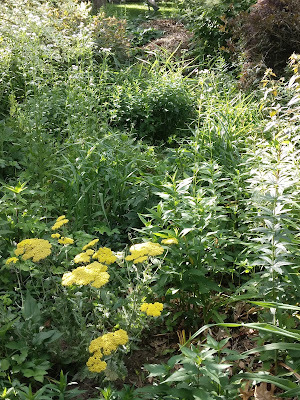 Achillea, or Yarrow, gives us big yellow flowers.
Achillea, or Yarrow, gives us big yellow flowers.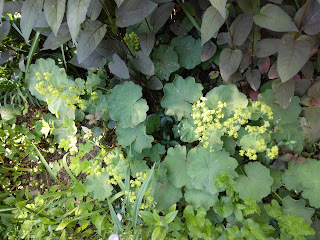 Lady's Mantle, delicate flowers in early June.
Lady's Mantle, delicate flowers in early June.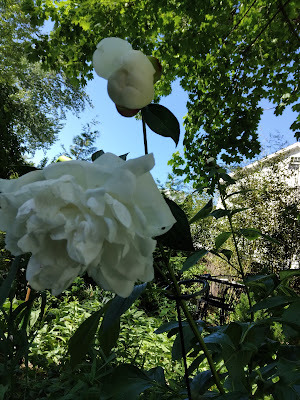 White Peony blossoms in June, even in this sheltered and too shady spot.
White Peony blossoms in June, even in this sheltered and too shady spot.
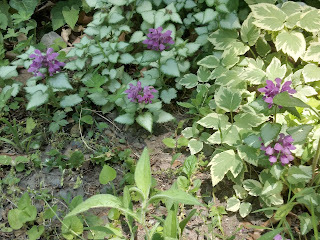 These red roses blossom on a very old vine. It was here when we arrived almost 20 years ago, but barely bloomed. It needs fertilizing and repeated pruning to keep it going strong.
These red roses blossom on a very old vine. It was here when we arrived almost 20 years ago, but barely bloomed. It needs fertilizing and repeated pruning to keep it going strong.
Lamium, or "Spotted Dead Nettle" is low, delicate groundcover, lovely when in flower.
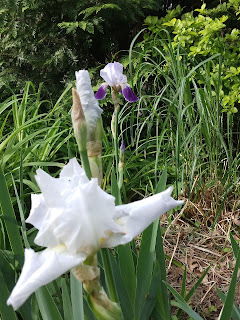 The flag Iris need attention too. When their rhizomes feel crowded they stop flowering.
The flag Iris need attention too. When their rhizomes feel crowded they stop flowering. 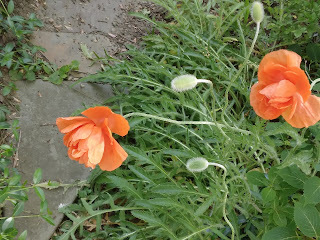 Icelandic Poppies, a fleeting pleasure.
Icelandic Poppies, a fleeting pleasure.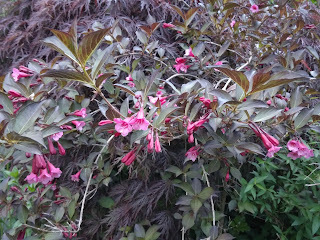 This Wigelia blooms strongly though it's getting crowded by a neighboring Japanese red maple.
This Wigelia blooms strongly though it's getting crowded by a neighboring Japanese red maple.
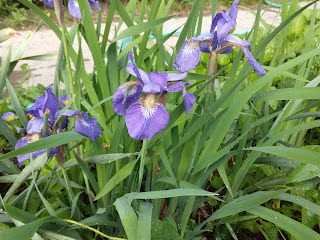
This Korean Lilac blooms copiously in May.
The Siberian Iris makes a lovely blossom, again in May.
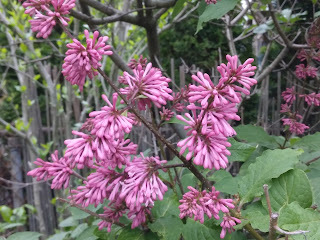 Before opening fully, these shapely Lilac blossoms have a strong color.
Before opening fully, these shapely Lilac blossoms have a strong color. 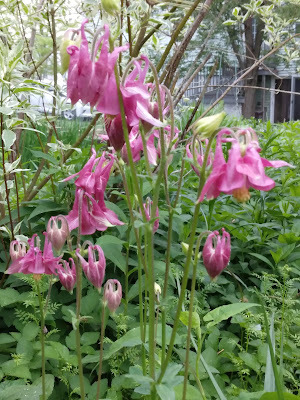 Columbine, an early May bloomer.
Columbine, an early May bloomer. 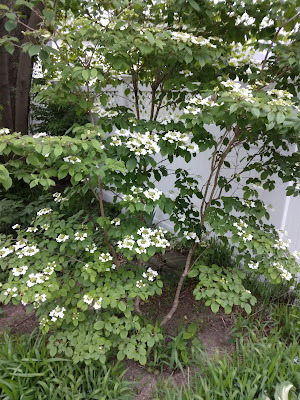 This small tree, a Viburnum, is called "Summer Snowflake." It bloomed in May,
This small tree, a Viburnum, is called "Summer Snowflake." It bloomed in May,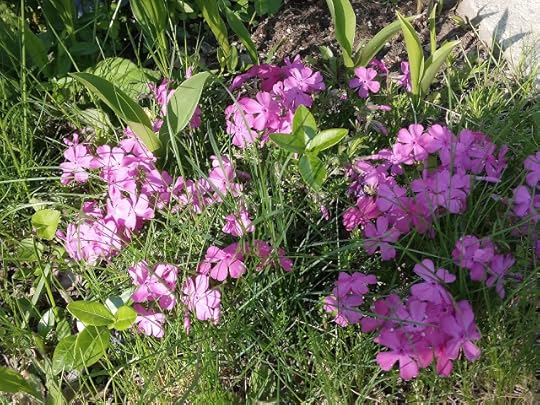
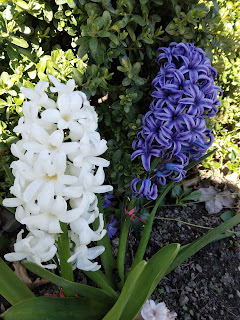 The low Phlox, above, required getting close to, to appreciate. It starts blooming in April.
The low Phlox, above, required getting close to, to appreciate. It starts blooming in April.
These Hyacinth bloomed under the Boxwood hedge in April.
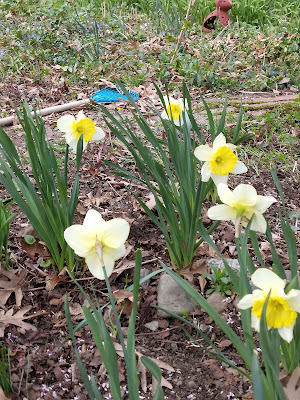
Before most garden plants had made presence known, these Daffodils were up and blooming. Some of the earliest flowered in March.
Poems of the Season: Lyrics on the Subjects of Spring, Trees, and Summer -- Wow, Three of My Favorite Things!
I've been busy in June. Our son Saul got married on June 4, to Emma Siegel, perfect ceremony
in a perfect place, the Tanglewood Music Center, in Lenox, Mass.
Then I got Covid, and took about a week of sleeping a lot and otherwise taking it easy to
make sure I was well and posed no danger to anybody else.
Then we went to another wedding. (So far OK.)
So I've been slow to post notice of my poems in the June edition of Verse-Virtual, the monthly
journal of the poetry community I am happily part of.
My poems this month address subjects that mean a lot to me and, one hopes, to everyone
else: spring, trees, and summer.
The Thing About Spring begins this way:
Once more the world, the landscape,
the place, the thing – everything that we are not
greens up, like a laugh in the heart of acreature in love
Something is loving the worldOnce again people do not entirely matter
The slaughter of the innocents enacted in this or that
corner of the world
is not, to all appearances, the only story
Once more, before our eyes the face of The Other changes, the object of perception
What do the philosophers make of this?
Do they say – like us? – the eyes of my eyes
may now be freshly engaged, transfixed,
that the miracle has shaken the grip
of our disbelieving heart?...
To read the remainder of this poem, and my other poems, "Heroes of the Arboretum" and"The Truth About Summer," and find your way to the rest of this issue, here's the link June 2022
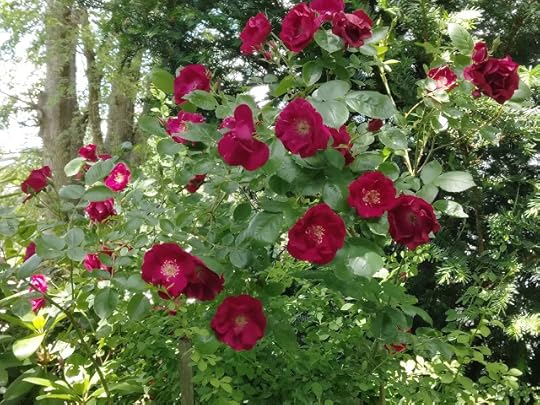
May 17, 2022
'The Garden in the Woods': Spring Flowers in a Curated New England Woodland
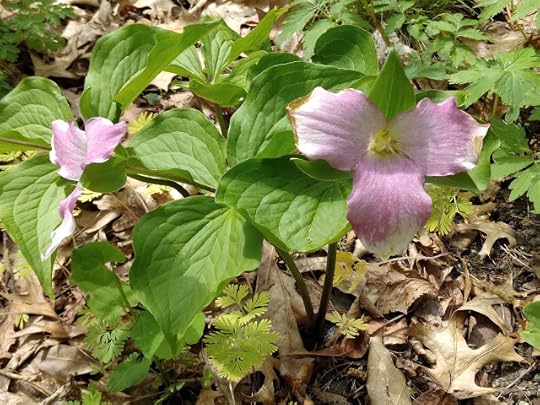
Three leaves on a stem, and three petals on the flower. This is a Trillium, one of the many varieties of the wildflower blooming now in "The Garden in the Woods" in Framingham, Mass. The second week of May is often peak season for the native wildflower Trillium,
I tried to catch a few of these beauties' names. Otherwise, they'll have to get along on looks alone. the plant below, with white blossoms, is "Trillium simile."
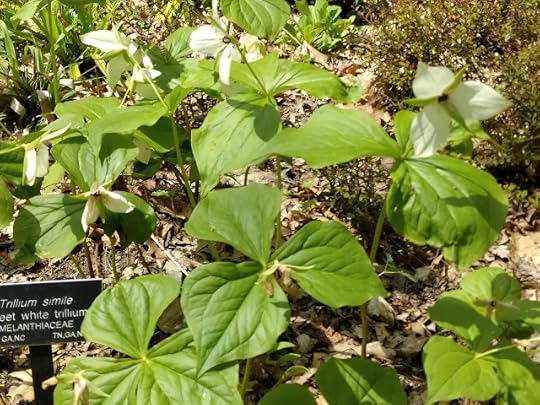
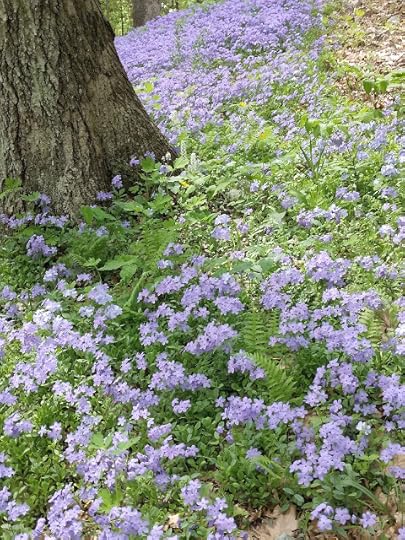
The plant below is Blue Moss Phlox. I think the photo above may show another low Phlox.

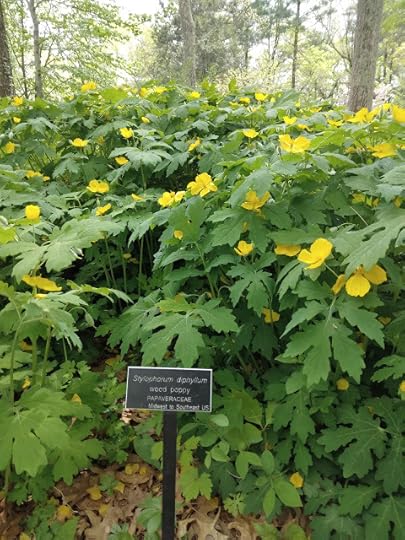 Wood Poppy
Wood Poppy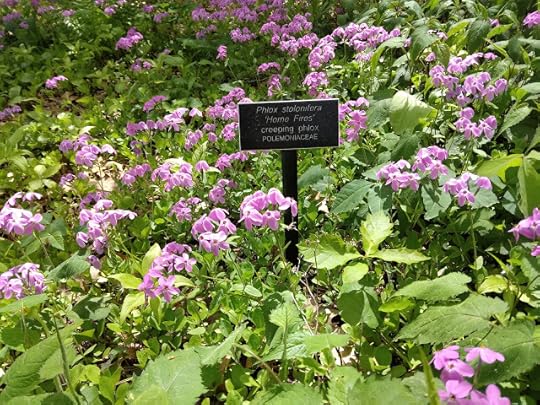
"Home Fries" Creeping Phlox
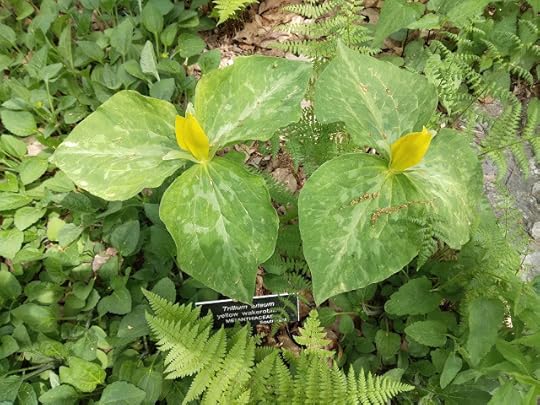
"Yellow Celebration" Trillium
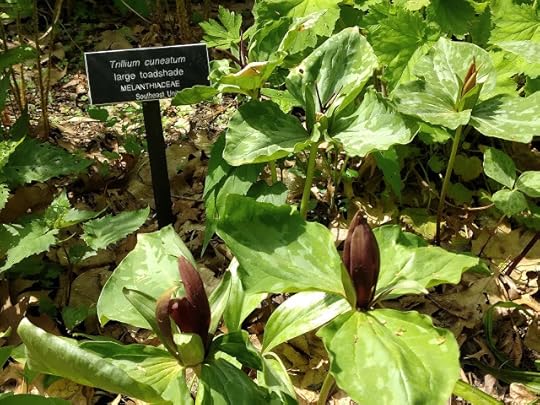
"Large Toadstool" Trillium
"Mount Airy" Witch Alder
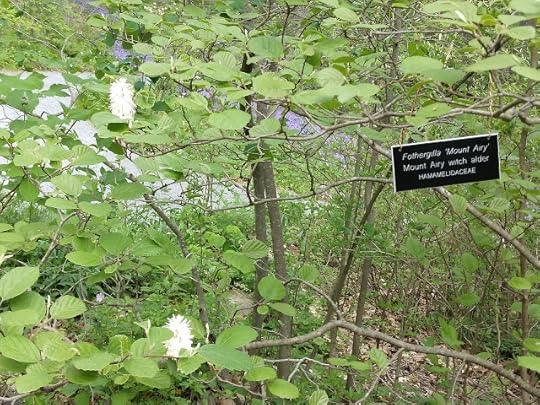
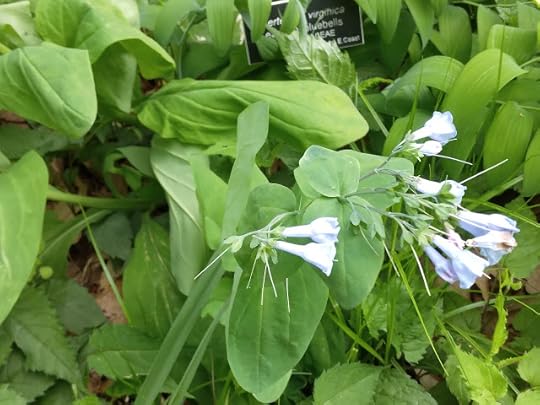
Bluebells
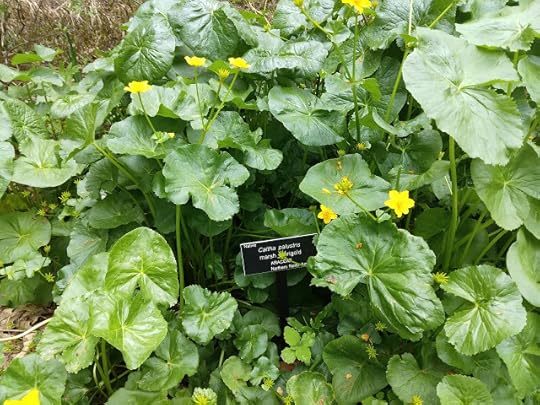
Marsh Marigold

Stiff Bluestar
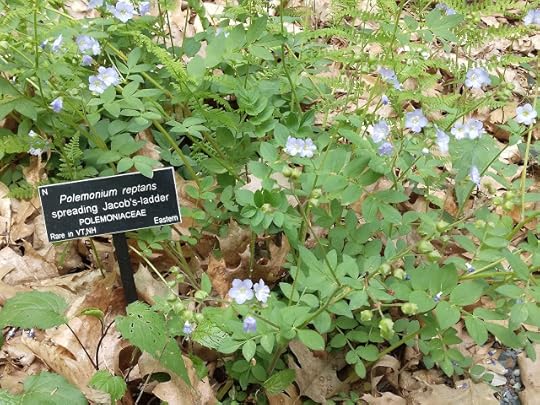
Spreading Jacob's-ladder
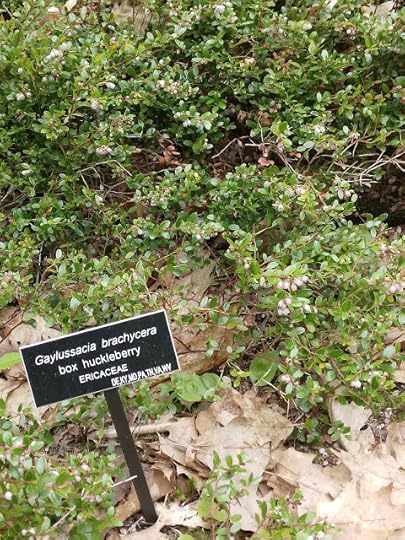
Box Huckleberry
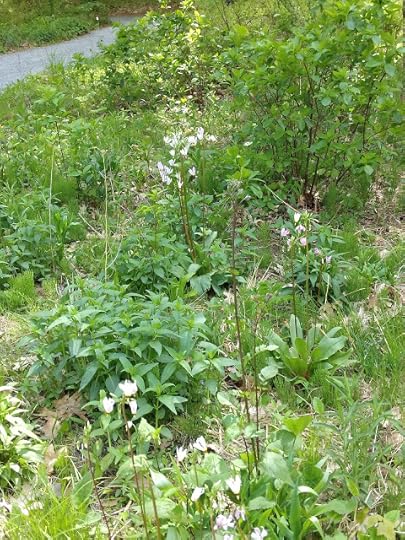
The tall white flowers are "Shooting Star"
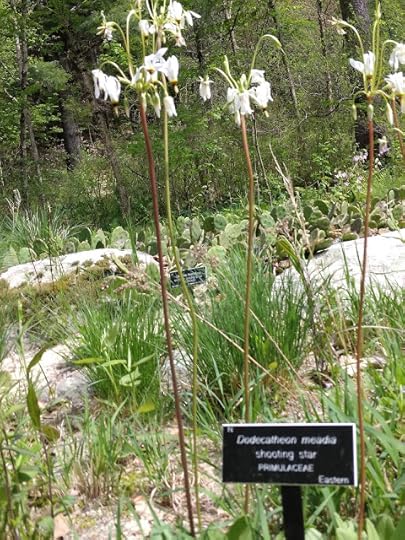
A more isolated shot of "Shooting Star"
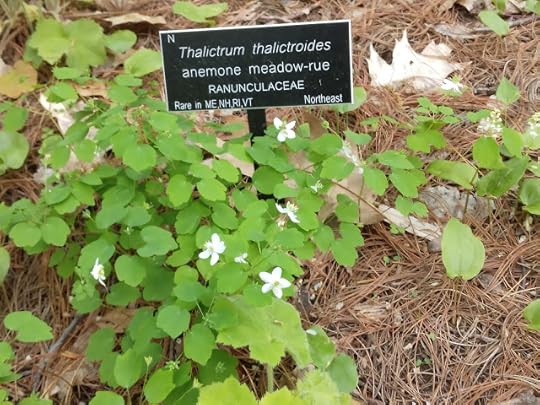
Anemone Meadow-rue
And so many other spring wildflowers in this woodland paradise I did not manage to get a photo of.
We'll just have to go back.
May 1, 2022
The Garden of Poetry and Prose: New Poems and a Story About Long Ago
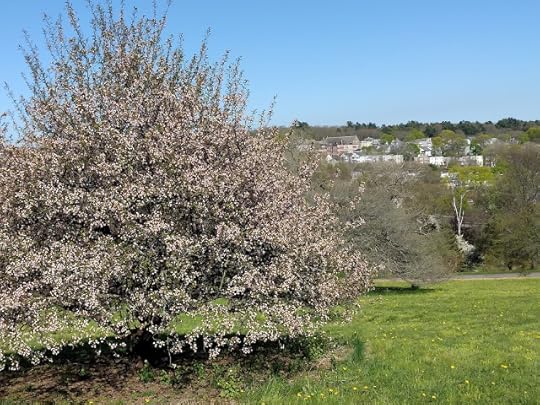
The May 2022 issue of Verse-Virtual offered an optional theme of the personal "impact of war." In response, I offered a poem about the impact of the Vietnam War and the draft on some long ago years when I was of draft age and the war in Southeast Asia dragged on. Here's the poem
Civil Wars
What war meant to me:
staying in school
keeping your deferment,
my father and I, who never
talked to one another about our lives,
staring at the screen when an image appeared from
“The March on the Pentagon,”
shots of protestors, a gesturing spokesman,
a “We Won’t Go” sign –
Dad said, “Oh, that’s last weekend…”
“I was there.”
“I thought you might be.”
No further exchange of views
followed
Dad never spoke of his war
until his final decade
Even when my older cousins marveled
over the souvenir German rifle in the basement
the story
was like pulling the dragon’s teeth
I had secrets of my own
When the Selective Service mailed my punitive
reclassification notice to the parental home address,
Dad threw me an anxious glance
“Don’t tell me you’ve gotten yourself
in trouble with those people!”
I denied it, like the cowardly apostle
at the crucifixion
The truth was,
both like and unlike Dad, I would never share
my story with my family:
I had.
I have two more poems in the May Verse-Virtual:
Today Is Beautiful, We Have Things To Do*
and
Everybody Wants to Rule the World
To check out these poem, here's the link: Verse-Virtual
Finally, here's my story about growing up in the late 60s, published by an online journal called "Jerry Jazz Musician." Music is a theme in my story, titled "Thunder." But so is adolescence, youth, the 60s, and falling in love.
Here's the link Thunder
Today was a beautiful day in the neighborhood of Planet Earth. Happy Spring! to all.
April 17, 2022
Local Author Speaking Series: I'll be speaking on (and reading from) "House Stories" in Plymouth

I will be speaking about – and reading from – my new book of linked short stories, "House Stories,” at Books & Sundry located at 150 Water St., Plymouth MA. The book is centered on a Connecticut commune, circa 1970 and the characters who shared the house. I’ll also talk about my novel, "Suosso's Lane," a novel based on the Plymouth origins of the notorious Sacco and Vanzetti case.
Here's the event announcement from Plymouth's new bookstore, Books & Sundry. Please note that the store requires registration for this free, public program.
"Bob Knox, formerly of Plymouth, joins us to talk about “House Stories,” his latest work of short stories. The collection is centered on a Connecticut commune, circa 1970 and the characters who inhabit it. Knox is also the author of "Suosso's Lane," a novel based on the Plymouth origins of the notorious Sacco and Vanzetti case. Previously, Knox was selected as a finalist for a Massachusetts Cultural Council fellowship and his stories have been published by Words With Jam, The Tishman Review, Lunch Ticket, and Unlikely Stories, among other journals.
"A Plymouth resident for 20 years, he worked as an editor for the Old Colony Memorial, winning awards for his editorials and arts coverage for a newspaper that was annually named Best Newspaper in New England in its class. He is currently working as a correspondent for the Boston Globe and working on another novel, "Karpa Talesman," which will be published by Hidden River Arts.
This event is free and open to the public. Registration required."
Here's the link to register:
March 5, 2022
Among the Lessons of the War on Ukraine: Never Too Many Democracies, and Why So Many of Us Care About These Refugees
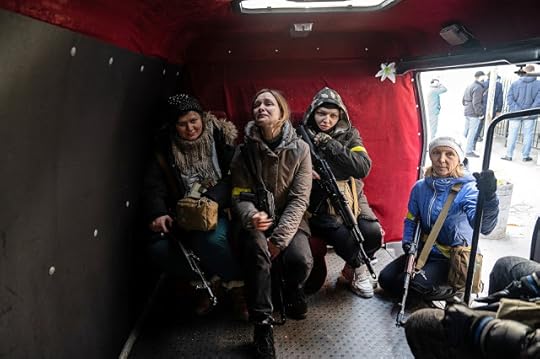
Ukraine has never been a particularly important country to America. It was never an independent country before the breakup of the Soviet Union in 1991. That’s when “the Ukraine” as Russian speakers and both their czarist and Soviet governments referred to that part of their domain called it — a name derived from a Slavic word for ‘borderland’ — lost its article, won its independence, and became simply “Ukraine.”
In Czarist Russia, and in the Soviet Union, Ukraine was part of Russia’s homeland. It was called Russia’s “breadbasket,” possessing some of the most fertile farmland in Europe. Many Americans, especially whose ancestors came to this country in the late 19th and early 20the centuries, can trace their roots back to Ukraine. Many of those immigrants were Jewish, because Ukraine was a part of Russia where Jews were permitted to live. But Ukrainians, Jewish and otherwise, faced the tyranny of the czar, in particular forced enlistment into the czar’s army, a likely death sentence.
So while claims that Ukraine had long been a part of Russia are certainly true, most Ukrainians were overjoyed to put an end to that subjective relationship. The United States, for comparison, had long been part of the British Empire, its people the subjects of that empire’s kings, before 1776. I don’t believe the Queen of England harbors any fantasies of reclaiming us like lost children in order to celebrate our Anglo-Saxon roots in one big happy family.
In world history terms, thirty years of independence is not a very long time. But, judging from Ukrainians’ brave, committed response to Putin’s despicable invasion, it appear that it does not take a people very long to develop a love for freedom and independence. People everywhere recognize and honor this emotional, and perhaps spiritual and moral, attachment to our country, our land. Parents would lay down their lives for their children. Families cling loyally to their members. And it is equally natural for human beings to love our home lands. For the great majority of the people of Ukraine, that love is for Ukraine, not for its ancient roots as a subject province of their Slavic cousins in Putin’s “Fatherland.” (Seriously, would you really want Putin for your father?)
Watching the abundance of video images coming these days from Ukraine, its people’s sufferings, and their brave determination to defend their homeland, I find it hard not to cry. It’s also hard not to clamor for our government to do more. To intercede militarily. To send food, and arms. To clear the skies of Russian aircraft with our own armed might. To rush anti-aircraft and anti-tank weaponry to the defenders through any route possible. To fill Poland with American military might — the very same response (it should be recalled) that did not make a difference in Afghanistan — and look for a pretext to send our armies and air power across the border to drive out the Russian invaders. To clear the Russian ships out of the Black Sea with the strength of the American naval power for which we spend billions every year but never — and I would add ‘happily’ — never use.
And I will also acknowledge that when we watch these images coming from a country under attack we are dealing with very deep issues here: families deciding how to protect their children; families forced to leave their elderly behind as they flee for safety; men staying behind to take up arms against an invader while bidding goodbye to their women and children sent away to unknown futures… I will acknowledge, that is, the difficult truth that some commentators have pointed out.
Many of us are ‘feeling for’ the Ukrainians the way we may not have felt (and certainly not to the same degree) for victims of wars in other countries throughout the world, simply because these people look like us. As the Ukrainians insist, in the face of Putin’s paternalistic fantasies, they are Europeans.
And that means for white Americans, like myself, they are white.
My theory is that it’s the back brain — the reptilian brain, the lizard brain — that controls these emotions. One of the first comments I read about the outpouring of American sympathy for the victims of this unprovoked assault by a smaller country by a bigger one was from an observer who praised the American outrage over this clear instance of aggression, but added, “sometime I would like to see the same support when the people fighting for justice and getting hurt are not white.”
I think those who have made troubling observations of this sort have a point. Should we not show a similar degree of support for other hurting peoples?
The civilian victims in Gaza, for example, including women and children, when Israel launches another of its punishment bombing raids and missile attacks on that stateless people in its endless war with Hamas.
Or the thousands of refugees from the Middle East who have not been afforded sympathy or afforded the same generous welcome by the European countries that are now welcoming Ukrainian refugees. Or when the refugees are Asian, Afghani, Central American, or African.
Should we not feel the same compassion for the boatloads of refugees from North Africa and the Eastern Mediterranean who are regarded merely as a problem, a burden, even a threat to a European nation’s way of life, traditional heritage and identity? Just as refugees from Central America, or Haiti, are turned away from America’s borders and told to wait in “temporary quarters” (that last forever) in Mexico, until we get to your case.
The “reptilian brain” theory I referred to above can be explained this way: According to a ‘triune’ model of the brain, dividing the brain into three main areas, the inner region of the basal ganglia is termed the ‘reptilian’ or ‘primal’ brain because it controls our innate, reflexively self-preserving emotions and behavior. These mental reflexes are thought to function in a way that ensures the survival of our species.
The implication is that when white people see other white people suffering, a part of us automatically responds by feeling, ‘hey, that’s us.’ Personally, I don’t have any Ukrainian blood in my ancestry, but when I see screen images of those strong, determined, suffering women, these valiantly committed guys, and the children who need their protection — I have a gut response that says “C’mon, we should be doing something to help!”
The Ukrainian defense of its homeland, the suffering of a people victimized by an aggressive neighbor, has a true, deeply felt, and undeniable claim on the sympathy of Americans and their fellow Europeans.
Our hearts go out to a brave people, as they should, and hopefully some enduring American assistance can follow in the wake of that emotion. But I wish our hearts would go out equally as strongly, and our material support be equally forthcoming, when the victims are Brown or Black.
Up Close and Personal in Three Poems for March: 'Kicking the Tires,' 'The Shape of You' and 'Food for Thought'
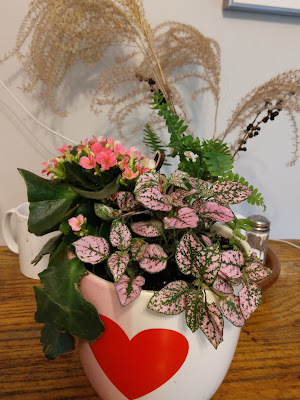
According to Anne (my wife and best critic) my poems in Verse-Virtual this month are unusually personal. One is a poem not only on the universal subject of getting older, but also on how it “shows up” -- especially in inconvenient places (like one's face).
My thanks to editor Jim Lewis for including "Kick the Tires" (the poem about aging), "The Shape of You" (about someone very close to me), and "Food for Thought" (about food).I'll post the one with most immediate relevance -- the poem about aging and appearance -- here. And also, see note below, because this (as we say in the newsy trade) is an ongoing story.
Kick the Tires
Most guys of an age, let’s face it (or maybe let’s not)
grow thick and long in the tooth
and are thinning up top
Others, the ones that work out, stand forth
like steel sculptures, shiny skulled, at senior events,
rusting in spots
To send even a ‘recent’ photo,
I mean, not yesterday exactly,
with my missing tooth and the cyst burning like a red tower
in a wasted portion of the kingdom
of the phiz…
but the day before, or the day before that,
may perhaps be regarded as an indulgence in ‘paint to sell’
I prefer to believe I have let them, my correspondents,
down easy
Oh, and for the record,
I am working on getting thick, and bald,
and generally not so spruce
It’s coming along
And yet, to send a photo only-a-few-years-back,
can it be so misleading?
I mean, I think (though I can be corrected)
I still clean up pretty, sort-of
until you kick the tires
Here's a quick postscript update on the "the cyst burning like a red tower"on face mentioned in the poem above. After four visits to doctors' offices, it turns out to be skin cancer.
To see the other 2 poems, and find new work by seventy other poets go here:
Verse-Virtual
https://verse-virtual.org/2022/March/...

